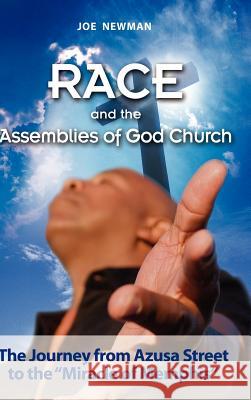Race and the Assemblies of God Church: The Journey from Azusa Street to the Miracle of Memphis » książka
Race and the Assemblies of God Church: The Journey from Azusa Street to the Miracle of Memphis
ISBN-13: 9781934043554 / Angielski / Twarda / 2007 / 240 str.
Race and the Assemblies of God Church: The Journey from Azusa Street to the Miracle of Memphis
ISBN-13: 9781934043554 / Angielski / Twarda / 2007 / 240 str.
(netto: 410,83 VAT: 5%)
Najniższa cena z 30 dni: 427,85
ok. 16-18 dni roboczych
Bez gwarancji dostawy przed świętami
Darmowa dostawa!
Race and the Assemblies of God Church chronicles the treatment of African Americans by the largest, predominantly white, Pentecostal denomination in the United States. The formation of the Assemblies of God in 1914, brought an end to the interracial focus of the Pentecostal movement that characterized the revival from its inception in Los Angeles, California, at an abandoned warehouse on Azusa Street in 1906. Dr. Newman utilizes the extensive archival holdings of the Flower Pentecostal Heritage Center, housed in the international headquarters of the Assemblies of God in Springfield, Missouri, to support his contention that Assemblies of God leaders deliberately engaged in racist efforts to prevent African American participation in Assemblies of God activities because the denominational leaders feared the reaction of its ministers and congregations in the American South. In addition, a concerted effort to refer African Americans interested in the Assemblies of God to African American groups, such as the Church of God in Christ, was approved at the highest levels of Assemblies of God leadership. Ultimately, efforts to exclude African Americans from the denomination led to official decisions to refuse them ordination and approved resolutions to support the establishment of a separate, unrelated Pentecostal denomination specifically for African Americans. Assemblies of God attitudes regarding racial issues changed only as a result of the civil rights movement and its effect upon American society during the 1960s and 1970s. The treatment of race in church groups with European origins was compared to that of the Assemblies of God and the influence of African and slave religions upon the rise of the Pentecostal movement. Finally, the author provides an analysis of the 1994 event known as the "Miracle of Memphis" in which white Pentecostal denominations dissolved the racially segregated Pentecostal Fellowship of North America in favor of a new organization, the Pentecostal and Charismatic Churches of North America. The book concludes that although current Assemblies of God leaders have embraced the concept of an integrated church fellowship that no longer excludes African Americans, there is virtually no evidence of wide acceptance of this concept at the local church level in the denomination.











